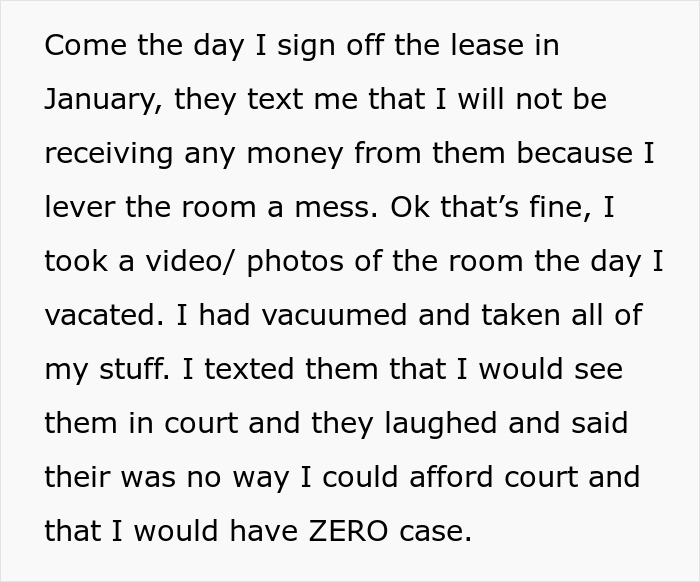From Pet Peeves to Court Fees - How One Woman Beat Her Roommates at Their Own Game
Living with friends sounds like a dream—until it turns into a cat-fueled nightmare. One woman thought she’d found the perfect setup with her ex-coworker, her fiancé, and their two dogs, but things unraveled quickly.
She brought her two cats along, thinking it would be a chill, pet-friendly household. However, after a month, her roommate suddenly declared that cats weren’t allowed upstairs, despite the dogs having free rein.
The OP tried to compromise with gates and closed doors, but her roommate wasn’t having it. Meanwhile, the dogs were messy, untrained, and clearly not held to the same standards.
Feeling that her cats were being unfairly treated—and possibly unsafe—the Redditor broke down and moved them to her parents’ house. The tension was palpable, and soon she decided to leave the lease entirely.
She agreed to pay a $300 lease exit fee, with the understanding that she would get her $700 deposit back. Her roommate and fiancé even confirmed it over text—it seemed like a done deal.
But when payday came, they ghosted her and claimed the room was dirty. The OP had receipts—literally—with photos and videos proving the room was spotless.
Not one to back down, she took them to small claims court, armed with evidence. The judge ruled in her favor, awarding her the full $700 plus $180 in court fees.
The Redditor just wanted to live with her cats in peace.

Experts say roommate drama is often fueled by unclear boundaries and pet-related tension. Curve Mag also notes that fur, smells, and messes can spark major conflict when expectations aren’t aligned.
Attorney Aaron Hall reminds us that tenants have rights—including fair treatment and privacy. He recommends setting clear agreements from the start to avoid messy disputes later.
You can read the original post by Reddit user 'lapsfordays' below.

"We all moved into a nice house."

Navigating Roommate Conflicts
Conflict resolution expert, Dr. Michele Weiner-Davis, emphasizes the importance of open communication in shared living situations. According to her research, misunderstandings often arise from differing expectations and assumptions about household rules.
In the case of this woman and her roommates, it seems clear that a frank discussion about pet policies could have averted much of the conflict. Dr. Weiner-Davis suggests initiating these conversations early on, which could forge clearer boundaries and foster mutual respect among housemates.
"Mario took very well to the change."

"I bought gates for doorways."

"Luigi finally became comfortable in the house."

Behavioral psychologist Dr. Daniel Kahneman points out that cognitive biases often influence our perceptions of fairness in shared living environments. His studies reveal that individuals tend to view situations through a lens of personal impact, which can lead to perceived injustices.
In situations like the one described, where pets are involved, establishing rules that accommodate all animals equally can help mitigate feelings of resentment. By approaching the situation from a collective standpoint, roommates can work toward a solution that respects everyone's needs.
"I then offered another solution."

"My cats were trapped."

"She was being ridiculous."

Legal Considerations in Shared Living
Real estate attorney, Nolo.com, advises that roommate agreements should ideally include pet policies to avoid future disputes. Including clauses about pet ownership can preemptively address potential issues and establish a legal framework for conflict resolution.
Having agreements in writing can protect all parties involved, allowing for clearer expectations. This type of proactive legal measure can save time, money, and emotional distress later on, particularly if the situation escalates to legal action.
"They switched up so quickly."

"I packed all my stuff and moved into my parents' house."

"I said they should pay it."

Dr. Sue Johnson, a pioneer in couples therapy, notes that the dynamics of cohabitation can often mimic those found in romantic relationships. She emphasizes that emotional safety is paramount in any shared living situation.
When individuals feel their needs are not being met—such as in the case of this woman and her cats—they may resort to defensive behaviors, which can further escalate conflicts. Dr. Johnson recommends employing active listening techniques to ensure everyone feels heard and valued in these discussions.
"They agreed to that."

"I texted them that I would see them in court."

"I proceeded to take them to small claims court."

Creating a Pet-Friendly Agreement
Animal behaviorist, Dr. John Bradshaw, suggests that creating a pet-friendly household involves more than just a verbal agreement. It’s vital for all housemates to discuss and agree upon specific responsibilities, including feeding, cleaning, and care routines.
By collaboratively establishing these roles, roommates can reduce misunderstandings and foster a more harmonious living environment. Additionally, periodic check-ins can help address any emerging issues before they escalate into significant disputes.
"I was so nervous."

"Of course, that is your money."

"I have photos of the room."

Dr. Carol Dweck, renowned for her work on mindset, explains that adopting a growth mindset can significantly impact how individuals navigate conflicts. Instead of viewing disagreements as insurmountable, those involved can see them as opportunities for learning and improvement.
In this living situation, a growth mindset can facilitate constructive discussions about pet policies, allowing each roommate to express their needs and preferences while remaining open to compromise. This shift in perspective can create a more collaborative atmosphere.
"Well, I changed my mind."

"That was amazing."

"Weird."

Financial Implications of Roommate Agreements
Financial expert David Bach emphasizes the financial risks associated with roommate disputes, stating, "Unresolved conflicts can lead to costly legal fees that can easily spiral out of control." This highlights the importance of setting clear agreements regarding household responsibilities and pet ownership from the beginning.
By dedicating time to draft a comprehensive roommate agreement, individuals can avoid potential legal battles and save significant amounts of money in the long run, as noted by Bach, who advises, "A little planning upfront can prevent a lot of financial headaches later."
"He makes his verdict."

"They decided to appeal."

"They just didn't seem like the best puppy owners."

Life coach Tony Robbins emphasizes the importance of setting clear intentions when entering into shared living arrangements. He advocates for open dialogues about each person's lifestyle preferences, including pet policies, to ensure everyone is on the same page.
This proactive approach can help prevent misunderstandings and foster a supportive environment. By being transparent about expectations, roommates can cultivate a sense of community and belonging that benefits all parties involved.
"Once, both dogs ran away."

"The dog always jumped."

"I win!"

Emotional Intelligence in Roommate Dynamics
Emotional intelligence expert Dr. Daniel Goleman suggests that cultivating emotional awareness can enhance roommate relationships. By recognizing and addressing emotional triggers, individuals can prevent minor disagreements from escalating into larger conflicts.
In the context of this situation, acknowledging feelings of frustration over pet policies can lead to a constructive dialogue rather than a confrontational one. Dr. Goleman advocates for developing self-regulation techniques to help navigate emotionally charged discussions more effectively.
A happy ending.

So, was she right to take it to court, or should she have let it go?
Online, people rallied behind the OP, cheering her for standing up and getting justice. They criticized the ex-roommates for their double standards and shady behavior.
“Those poor dogs.”

“Better to live on your own.”

Dr. Pasi Sahlberg, an education expert, stresses the importance of creating a cooperative learning environment, which can be applied to shared living situations. When roommates collaborate on setting boundaries and expectations, it fosters mutual respect and responsibility.
By using techniques such as brainstorming sessions and role-playing, individuals can better understand each other's perspectives and work toward a harmonious living arrangement. Establishing a collaborative framework can effectively address potential conflicts before they arise.
“Such entitled jerks.”

“Should call the ASPCA.”

“Great win!”

Future-Proofing Cohabitation Agreements
Family therapist, Dr. Alexandra Solomon, emphasizes that "establishing clear communication channels is essential for any shared living arrangement." She suggests that future cohabitation agreements should include provisions for conflict resolution, such as regular house meetings to discuss any issues that arise, ensuring everyone's voice is heard. Creating a culture of open communication can help prevent misunderstandings and foster a sense of community. As Dr. Solomon notes, "When everyone feels heard, it leads to a more harmonious living environment." Establishing these practices early on can make it easier to navigate changes and challenges as they arise, leading to a more enjoyable living experience.
“Good for you.”

In the end, justice—and cats—prevailed. This story proves that standing up for yourself, even in messy roommate drama, can pay off big time.
Whether it’s pets, deposits, or boundaries, clear communication is key. And if all else fails, don’t be afraid to take it to court—just make sure you’ve got the receipts.
Expert Opinion
This article highlights how unresolved conflicts, especially around shared spaces and differing expectations about pets, can escalate quickly in roommate situations. The woman’s insistence on fairness and her protective instincts over her cats reflect a strong need for autonomy and justice, which are key psychological motivations in interpersonal disputes. When boundaries aren't clearly established, it often leads to misunderstandings and resentment, as we see in this case, making it crucial for roommates to communicate openly from the start.Therapeutic Insights & Recovery
In summary, navigating roommate relationships requires a blend of open communication, emotional intelligence, and proactive planning. Experts recommend establishing clear agreements from the outset, including pet policies and responsibilities, to mitigate potential conflicts.
By employing techniques such as regular check-ins and collaborative discussions, individuals can create a harmonious living environment that respects everyone's needs. Ultimately, fostering an atmosphere of mutual respect and understanding can transform a potentially chaotic cohabitation experience into a fulfilling and supportive shared space.



